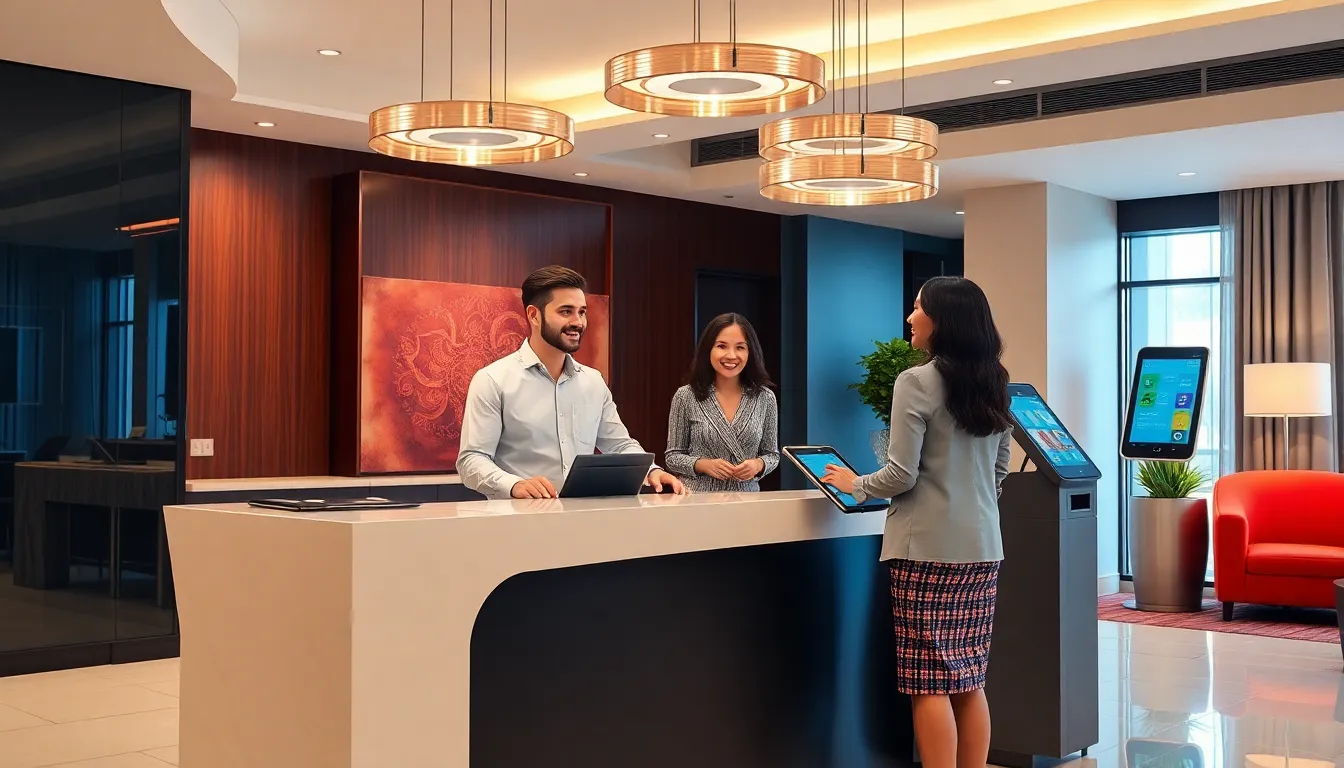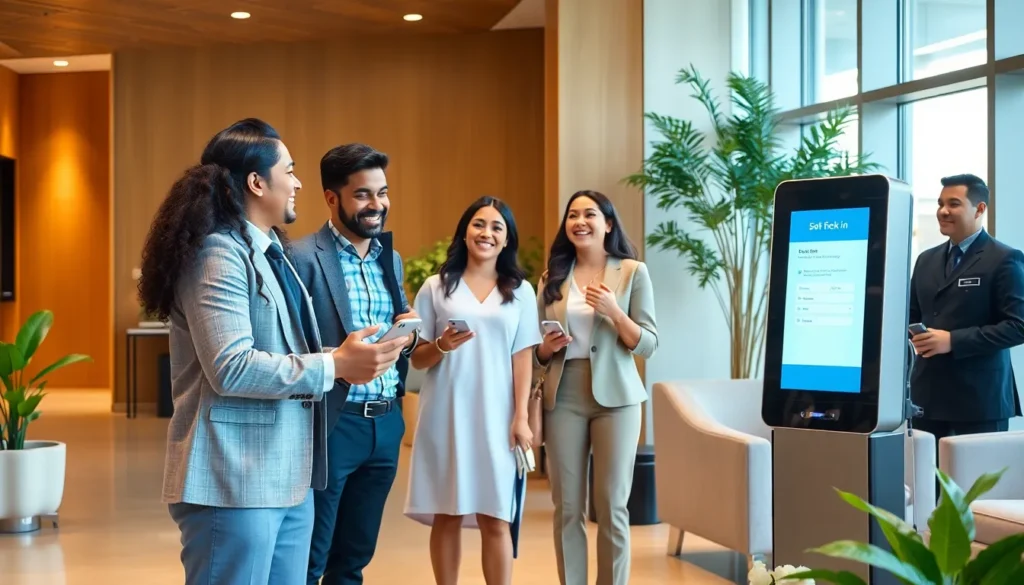In a world where guests expect five-star service at the click of a button, hospitality technology solutions are the unsung heroes of the industry. Imagine a hotel where check-in is as smooth as butter and room service arrives faster than you can say “where’s my snack?” These tech innovations aren’t just gadgets; they’re the magic wands that transform ordinary stays into extraordinary experiences.
With the right technology, hotels can streamline operations, delight guests, and boost revenue—all while making staff members look like rock stars. From smart room controls to AI chatbots that never need a coffee break, hospitality tech is here to save the day. So, buckle up and get ready to explore how these solutions are revolutionizing the way we experience hospitality. After all, who wouldn’t want to stay somewhere that feels like a warm hug wrapped in a cozy blanket of tech-savvy efficiency?
Hospitality Technology Solutions
Hospitality technology solutions play a pivotal role in transforming the guest experience within the hotel sector. These solutions streamline operations, enhance satisfaction, and elevate revenue generation.
Definition and Importance
Hospitality technology solutions encompass various tools and systems designed to improve hotel operations and guest relations. These systems include property management software, point of sale systems, and customer relationship management tools. Their importance lies in the ability to offer personalized experiences, enabling hotels to cater to diverse guest preferences. By simplifying reservations and optimizing service delivery, these technologies increase efficiency and create memorable experiences. Successful implementation leads to improved staff productivity and enhanced guest loyalty.
Key Trends in Hospitality Technology
Several trends are shaping the future of hospitality technology. First, mobile applications are becoming essential for guests, providing quick access to services. Second, contactless technologies allow for seamless check-ins and payment processes, ensuring guest safety and convenience. Third, data analytics offers insights into customer preferences, enabling tailored marketing strategies. Fourth, artificial intelligence is streamlining customer service via chatbots, enhancing responsiveness. Lastly, sustainable technology is gaining traction, with hotels adopting eco-friendly solutions to meet environmental goals. These trends highlight a shift toward enhanced operational efficiency and guest-focused innovations.
Types of Hospitality Technology Solutions

Hospitality technology solutions encompass various tools designed to enhance operations and guest experiences. Each type plays a pivotal role in streamlining processes and maximizing efficiency.
Property Management Systems
Property management systems (PMS) serve as the backbone of hotel operations. These software platforms manage bookings, room assignments, and billing efficiently. By integrating with other technologies, PMS offers centralized access to crucial information, such as guest profiles and payment details. Enhanced reporting features provide insights into occupancy rates and revenue trends, helping managers make informed decisions. Additionally, automation reduces manual tasks, freeing staff to focus on guest engagement. A robust PMS ultimately elevates operational productivity and guest satisfaction.
Point of Sale Systems
Point of sale (POS) systems are essential for managing transactions throughout the hotel. They streamline payment processing for various services, including food, beverages, and retail products. By enabling staff to process payments quickly, POS systems enhance the guest experience. Integration with the PMS ensures consistency across departments, allowing for accurate billing and inventory management. Real-time data helps hotels analyze sales trends and customer preferences, supporting better menu planning and promotional strategies. An effective POS system can significantly contribute to revenue growth.
Guest Experience Solutions
Guest experience solutions focus on enhancing interactions and satisfaction for hotel visitors. These technologies may include mobile check-in apps, chatbots, and personalized service platforms. Mobile check-in allows guests to skip long lines and access their rooms swiftly. Chatbots provide immediate assistance, answering questions and fulfilling requests 24/7. By analyzing guest feedback and behavior, hotels can tailor services to individual preferences, further improving the overall experience. Implementing these solutions fosters loyalty and encourages positive reviews.
Benefits of Implementing Hospitality Technology Solutions
Implementing hospitality technology solutions offers numerous advantages that enhance hotel operations and guest experiences. These benefits include increased efficiency, enhanced guest experience, and improved data management and analytics.
Increased Efficiency
Automation of routine tasks significantly boosts operational efficiency. Staff members save time on administrative duties, allowing them to focus on guest needs. Property management systems streamline check-in and check-out processes, reducing wait times. Point of sale systems handle transactions quickly, facilitating real-time reporting and inventory management. These enhancements lead to smoother operations and more effective resource utilization.
Enhanced Guest Experience
Personalized service elevates the overall guest experience. Technology enables hotels to tailor offerings based on guest preferences, fostering loyalty. Mobile apps allow for convenient booking and service requests. Contactless check-in options provide a seamless arrival, minimizing friction during the process. Chatbots deliver instant support, answering inquiries promptly, ensuring satisfaction throughout the stay.
Data Management and Analytics
Sophisticated data management tools empower hotels with actionable insights. Analyzing customer data helps identify trends and improve marketing strategies. Advanced analytics facilitate better decision-making regarding pricing and service enhancements. Efficient management of guest information strengthens relationships through targeted communications. Leveraging these insights ultimately drives revenue growth and enhances operational strategies.
Challenges in Adopting Hospitality Technology Solutions
Adopting hospitality technology solutions comes with challenges that hotels must navigate. Cost considerations play a crucial role in this process. Investing in new systems can require substantial upfront expenditure, including software licensing, hardware, and ongoing maintenance fees. Budget constraints often limit which technologies hotels can implement. Additionally, potential hidden costs can arise, such as training staff or integrating new systems with existing ones.
Integration with existing systems presents another significant hurdle. Many hotels use outdated technology that may not seamlessly connect with modern solutions. The complexity of merging new software with legacy systems can lead to operational disruptions. Data migration often adds another layer of difficulty. Hotels must also consider their staff’s adaptability to new technologies, as insufficient training can hinder successful implementation.
Future of Hospitality Technology Solutions
Emerging trends and innovations continue to reshape the hospitality landscape. Increased demand for efficiency and personalization drives advancements in technology solutions.
Innovations on the Horizon
Innovative technologies are poised to elevate the hospitality experience. Voice-activated devices enhance guest interactions, allowing for a more seamless stay. Smart room technology adjusts lighting and temperature based on preferences, contributing to comfort. Cloud-based solutions improve data accessibility, streamlining operations across multiple properties. Blockchain technology ensures secure transactions, enhancing trust in guest experiences.
Impact of Artificial Intelligence
Artificial intelligence (AI) plays a crucial role in transforming hospitality operations. Personalized recommendations increase guest engagement, making stays more memorable. AI-powered chatbots offer instant support, answering queries and simplifying service requests for guests. Predictive analytics analyze customer data to optimize pricing and enhance marketing strategies. These advancements boost operational efficiency and heighten guest satisfaction, paving the way for a more innovative hospitality sector.
Conclusion
Embracing hospitality technology solutions is no longer optional for hotels aiming to thrive in a competitive landscape. By integrating innovative tools, hotels can significantly enhance guest experiences while streamlining operations. These solutions not only boost efficiency but also foster loyalty through personalized interactions.
As the industry evolves, staying ahead of emerging trends will be crucial. Adopting technologies like AI and cloud-based systems can transform how hotels operate and engage with guests. While challenges exist in implementation, the potential rewards far outweigh the hurdles. Investing in the right technology is an essential step towards creating memorable stays and achieving long-term success in the hospitality sector.

